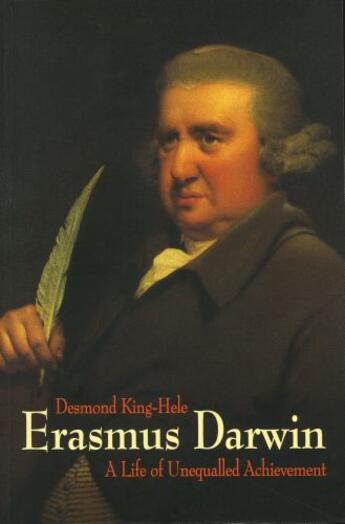-
Nombre de pages : (-)
-
Collection :
(-)
-
Genre :
(-)
-
Thème :
Non attribué
-
Prix littéraire(s) :
(-)
Résumé:
It has been said of Erasmus Darwin (1731-1802) that no one from his day to ours has ever rivalled him in his achievements in such a wide range of fields. He was a far-sighted scientific genius, fertile in theory and invention, and one of the foremost physicians of his time. His gift for... Voir plus
It has been said of Erasmus Darwin (1731-1802) that no one from his day to ours has ever rivalled him in his achievements in such a wide range of fields. He was a far-sighted scientific genius, fertile in theory and invention, and one of the foremost physicians of his time. His gift for friendship enabled him to recruit the members of the Lunar Society of Birmingham which is often seen as the main intellectual powerhouse of the Industrial Revolution in England. He was especially close to Franklin, Wedgwood, Boulton and Watt. Towards the end of his life he gained recognition as the leading English poet in the country, and he deeply influenced Blake, Wordsworth, Coleridge and Shelley. The most striking of Darwin's many talents was his extraordinary scientific insight in physics, chemistry, geology, meteorology and all aspects of biology -- his deepest insight being his evolutionary theory of life. Two of his books, the Zoonomia, which made him famous as the leading medical mind of the 1790s, and The Temple of Nature, a long poem, show that he believed life developed from microscopic specks in primeval seas through fishes and amphibians to 'humankind'. But he failed to convince the world about biological evolution: that was left to his grandson Charles. Erasmus was the first person to give a full description of how clouds form and of photosynthesis in plants. He was also an obsessive inventor of mechanical devices, among them a speaking machine, a copying machine and the steering technique used in modern cars. Substantial donations of Darwin family papers recently to the Cambridge University Library, including over 170 letters written by Erasmus Darwin himself, have made it possible for the author to tell much of the enthralling story of his life in Erasmus' own words. Desmond King-Hele, who is the leading authority on Erasmus Darwin having studied his life and work for three decades, is a mathematician and physicist who is an expert on space research by satellite, in particular on the Earth's gravity field and the upper atmosphere. W.F. Bynum in Nature: To most people who have heard of him, Erasmus Darwin was a successful doctor, bad poet and, most significantly, the grandfather of Charles Darwin. In this astonishing book, Desmond King-Hele seeks to reverse the judgement and argue that Charles should rather be remembered as Erasmuss grandson...[that] Erasmus was much the brighter spark, a genius of rare qualities...Few scientific lives have ever been so carefully and thoughtfully examined. There are no final words in history, but this is a biography for which the word definitive can be aptly applied. Patricia Fara in Times Higher Educational Supplement: Instead of being dismissed as the whimsical creator of a bizarre tale of gaudily dressed characters engrossed in various forms of polygamy, [he] is now recognized as an influential author and an important man of science who made vital contributions to the early stages of English industrialization...A moving and amply researched narrative of a man who for [the author] has acquired a heroic stature... Choice: ...King-Heles splendid biography of Charles Darwins grandfather...
Donner votre avis














